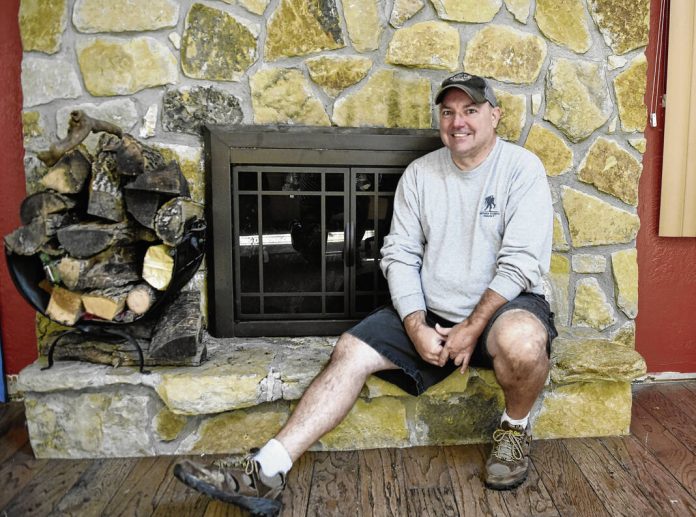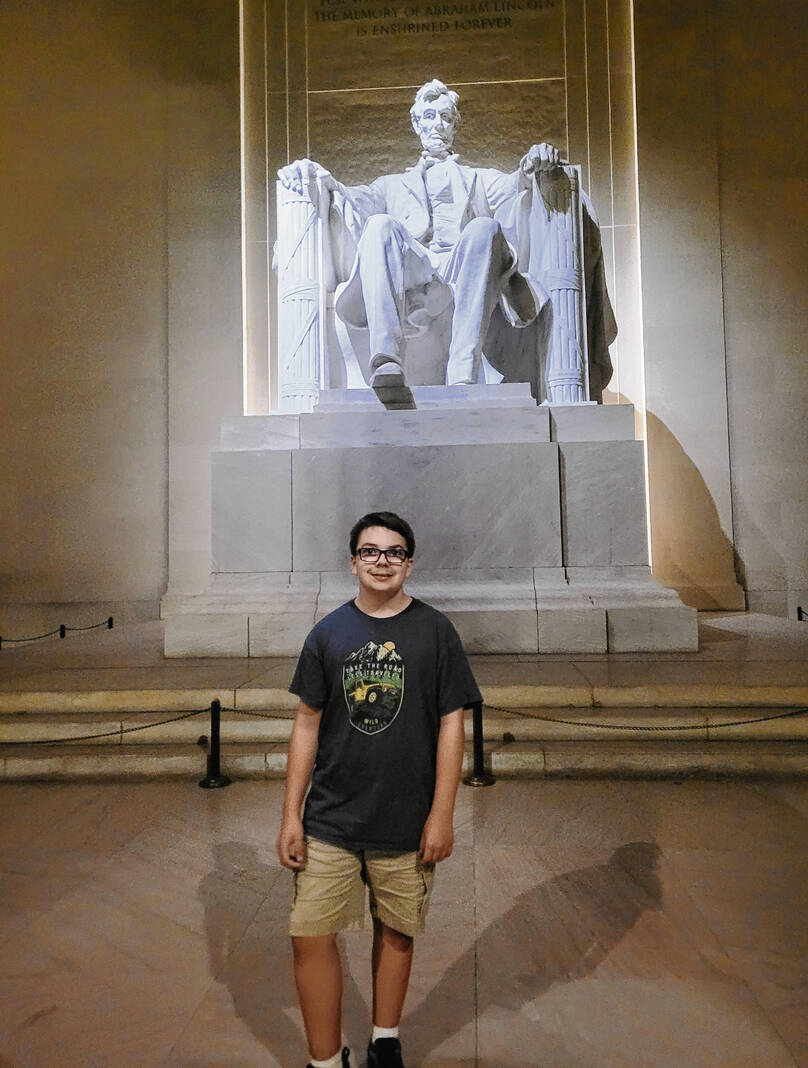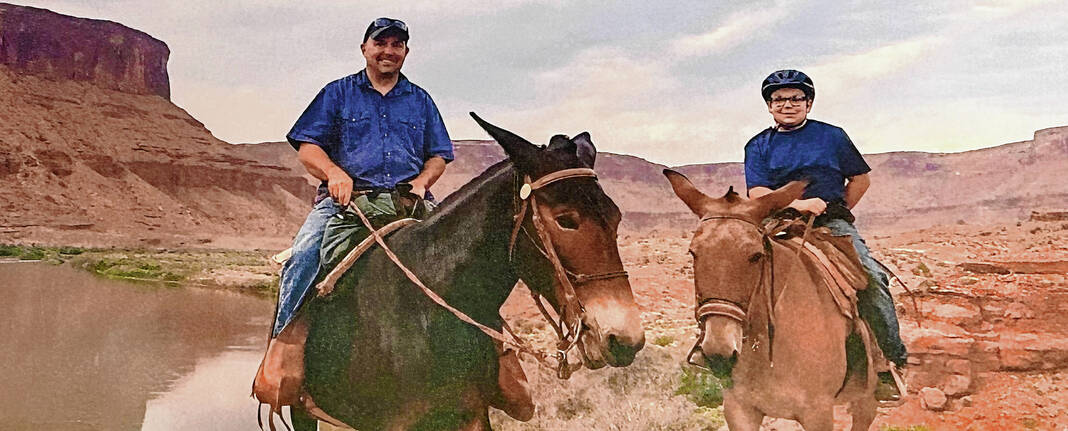The explosion came out of nowhere.
Nick Bennett had been working with his fellow Marines at a base in Mahmoudiyah, Iraq, preparing equipment and vehicles for a quick-strike mission. Suddenly, he heard a whistling coming from over his shoulder, and the world shattered to pieces.
The incoming missile malfunctioned; if it had gone off as it was supposed to, it would have left a radius of death as big as a football field. But it still took the lives of some of Bennett’s fellow soldiers, and left him critically injured.
He didn’t know how he would recover.
“I went from this tough Marine who could take on the world to someone who I thought was broken and useless,” he said.
But Bennett did recover. After suffering the catastrophic injury, he found healing in an easily accessible place — the outdoors.
From horseback riding to hiking to boating on Lake Michigan, the experiences out in nature have served as a balm for his body and his mind. With the help of organizations such as the Wounded Warrior Project, as well as federal programs offering free passes to national parks, he was able to reconnect with his family, reclaim his health and rediscover his own self-worth.
He is using his experience to help other veterans understand that even after injury, they can regain control of their lives. For him personally, the outdoors has helped save him.
“Being in the middle of a lake in a boat, being in the woods, there’s no doctor’s appointments, there’s no therapeutic appointments,” he said. “I lived with someone trying to kill me every day of my life. All of that is gone now.”
The photos and mementos cover the walls of Bennett’s rural Johnson County home just south of Franklin. Snapshots of him and his children camping in Indiana state parks, kayaking on nearby rivers and horseback riding among the spectacular rock formations of Moab, Utah.
Trips to Denali in Alaska or Lake Michigan to sail are captured forever, alongside pins, flyers and more from their extensive travels.
All of the trips were filled with memory-making moments, laughs and true connection with his loved ones. Each also had their share of hurdles, which were just as valuable.
“You can never prepare for adversity in life, but you may be hiking or camping or horseback riding, and we definitely faced a little bit of adversity doing that stuff,” he said. “There has been tears, there has been a little blood. But being able to get out there and unplug, to be in the moment, is huge.”
There was a time when Bennett never knew if he’d get to enjoy that again.
Military service was a tradition in his family. Both of his grandfathers served in World War II, one in the U.S. Army serving in Germany who ended up being a prisoner of war, while the other in the U.S. Navy in the USS Sunfish submarine. His uncles all served in the military.
So Bennett always thought he’d serve — when he was in high school, he went to talk to a Navy recruiter. When the recruiter told him he’d need to get shots to join, Bennett and his fear of needles changed course, instead joining the U.S. Marine Corp.
“Being stupid, I never asked the Marine recruiter that question. Marines get just as many shots as the Navy does,” he said, laughing.
Bennett served for six years in active duty Marines, getting married and having three kids during that time. When he finished his stint, he did two more years in reserves, finishing in 1996. As his children grew older, he decided to re-enlist in the reserves in 2004.
His unit had received warning that it would likely be sent to Iraq, as the United States was in the midst of the Iraq War. But they didn’t know which guys were going or which operations were going to be called up.
“Every day, it was like, ‘Hey, I want to go, I want to go,” he said. “We ended up leaving in June 2004.”
Bennett’s unit trained and flew into Iraq in September, getting sent to Mahmoudiyah — a dangerous village known as the “Gateway to Baghdad.”
“We were basically at the crossroads of the insurgencies. Guys would get chased out of places like Fallujah, and come through our area. We were on the deadliest road,” he said.
Bennett initially worked in the base’s internet cafe, working phones and computers so fellow soldiers could keep in touch with people back home. But his preference was to be out with his unit doing more active work, he said. He was placed on base security keeping watch for threats and checking all vehicles who left and arrived to the base. During the day, he would also leave the base on missions.
By the end of 2004, Iraqi insurgents were making frequent attacks on the base in efforts to weaken American forces stationed there. Mortar attacks were a daily occurrence.
On Veterans Day, 50 soldiers, including Bennett, were stationed at the post working on equipment. That’s when a 107-millimeter Chinese rocket struck just feet away from him.
“It has a kill radius of a football field, so if it would have worked, 50 of us should have been pink-misted, no questions asked,” he said.
Bennett found himself on his back, disoriented and dazed. Quickly he was rushed to the base’s medical center, stabilized, then moved to Baghdad and then to Germany. Five days after the attack, he returned to the United States, where he’d spend the next two months at Walter Reed National Military Medical Center in Bethesda, Maryland.
He endured 26 surgeries to repair his hands, shoulder, back, and leg, which had a hole all the way through it. Shrapnel is still in his left arm, and he had been impaled by the missile shell casing in his right shoulder.
His therapist told him he’d never run again.
“Before this, I played softball with my dad for years. Having kids, we were always active and riding bikes. It’s always been a big part of my life,” he said.
The physical injuries and recovery, combined with post-traumatic stress disorder, devastated his life. His marriage fell apart, and his relationship with his children deteriorated.
“I felt like a failure as a dad. When thunderstorms would hit, how could I protect my kids when I just wanted to crawl under the table with them,” he said.
But Bennett found a lifeline with the Wounded Warrior Project. The nonprofit was founded to provide simple care and comfort items to the hospital bedsides of the first wounded service members returning home from the conflicts in Iraq and Afghanistan. Over time, programs and services have expanded to focus on mental health, career counseling, and long-term rehabilitative care, along with our advocacy efforts.
One of their concerns is focusing on getting veterans active, said Meghan Wagner, director of physical health and wellness for Wounded Warrior Project. Coaching, wellness challenges and sports clinics are just a few of the offerings the group puts on.
“Physical health is just one component of quality of life, and that’s a big part of our mission and our programming — to improve the overall quality of life for warriors and family members we serve,” she said.
Growing up a Notre Dame football fan, he was invited to take part in a Wounded Warrior Project excursion to a Fighting Irish football game. The organization provided a stabilizing sense of camaraderie.
“I tell people it’s not about football games, it’s not the event. What a lot of people don’t realize is that a lot of these guys won’t go out in the middle of the day, because of the crowds. What this teaches is, you can be safe in a crowd, with the anxiety,” Bennett said. ”They teach putting tools in the toolbox to help you live life.”
Through his involvement with Wounded Warrior Project, Bennett began to understand his injuries did not prevent him from being active outdoors. He attended different activities, such as boating in Wisconsin, bicycling around the country or going golfing with his youngest daughter, Amber, and his son, Eli.
“They provide an environment to show you that you won’t drown, you can be safe,” he said. “So I knew I could go back home and get in a kayak with him. I could still hit a golf ball.”
One particularly poignant moment came when he took a sailing trip with Amber, accompanied by a Wounded Warrior camera crew. Amber was always reluctant to hear the story of Bennett’s injury; she refused to hear what happened to her father.
But together on the boat, when the camera crew asked him to recount his injury, she said it was OK.
“Because of Wounded Warrior Project, I was able to heal with my little girl in a way that I never would have had the opportunity without them,” he said. “I tell everybody, coming off that boat, the dock was like a brand new pathway that opened up in my life. We’ve been walking down that path ever since.”
The outdoors, in particular, are important to veterans’ recovery.
“We want to encourage adventure and movement through physical activity that can reduce stress and help with sleep regulation. It has a multitude of physical and mental health benefits,” Wagner said.
That has been made clear after Bennett learned about a program for veterans offering free passes to all U.S. National Parks. He found the program while researching a trip to Alaska, and has used it to travel everywhere from the Grand Canyon to parks all over the Midwest.
Those trips, combined with camping, hiking and more all over the country, has changed Bennett’s perspective on what he was still able to do.
“It shows that I’m not broken and useless. I can still lead,” he said.
AT A GLANCE
National Parks Pass
What: U.S. military veterans and Gold Star Families can take advantage of a free lifetime pass, and current U.S. military members and their families can receive a free annual pass, each giving access to over 2,000 recreation areas across the nation.
Why: This free pass gives access to improved mental, physical, and immune health from simply getting outside. The pass not only includes famed national parks, but it’s historical sites and federal parks all over the country.
Information: Go to www.nps.gov/planyourvisit/veterans-and-gold-star-families-free-access to learn more and find out where to get the pass.











